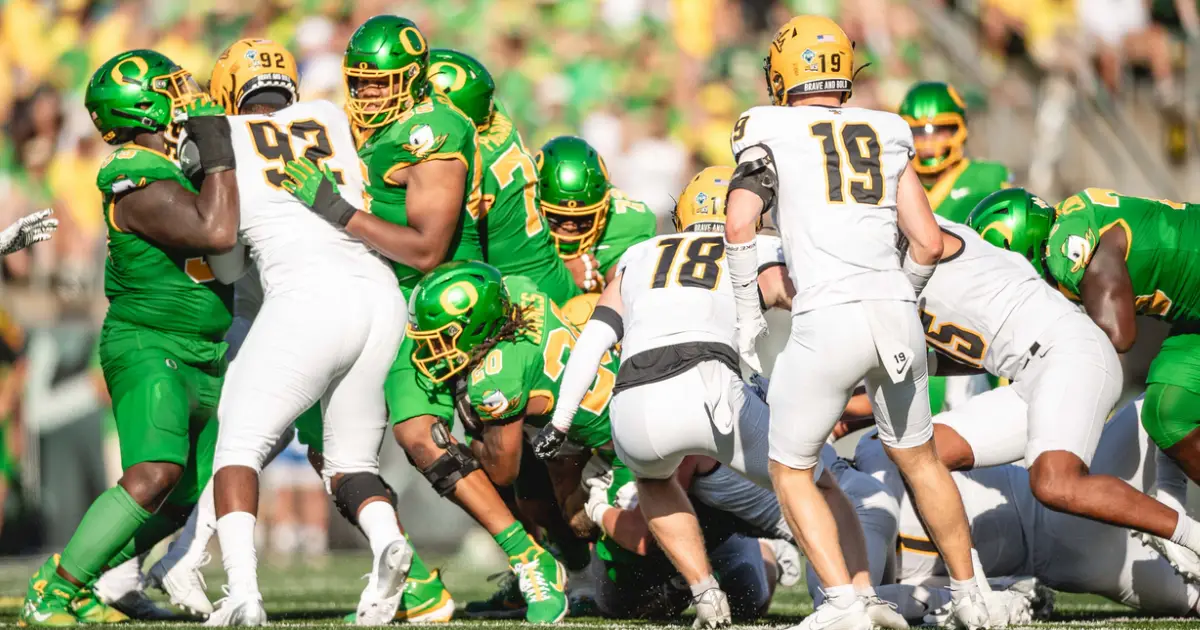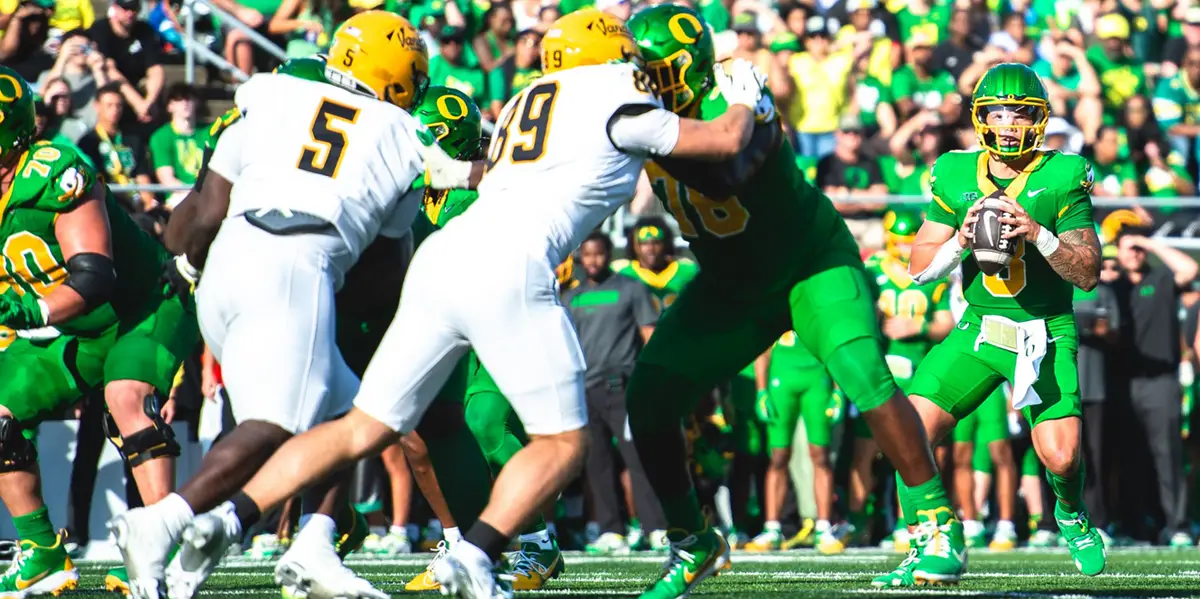Oregon’s offensive line play last Saturday left a lot to be desired, and that feels like an understatement. The Ducks might be lucky enough to have Matthew Bedford back as as starter this week, and it still may take a couple of weeks for Dave Iuli to rotate back into the offensive line as well. But it feels like there needs to be a contingency plan if these two players can’t make it back into the rotation soon.
The right side of the offensive line struggled the most last Saturday. Ajani Cornelius has been a steady veteran at tackle, which was a surprise, but perhaps less so with two significant changes to the offensive line. Charlie Pickard, a walk-on, took over at center while starting center Iapani Laloulu shifted over to right guard.
Pickard played pretty well on the whole, but the right side of the line was awful — and that isn’t to say that Laloulu and Cornelius are bad. Both are starters in their own right, but they are also not used to playing next to each other. Then the whole offense line felt less focused and just off. There is too much returning talent on this offensive line for it to be this bad. Laloulu wasn’t a starter last year but he did start against Liberty in the Fiesta Bowl, and the offensive line rolled the best the G5 could throw at them.
But there is one change this year that is perhaps more subtle that might be playing a bit of a role in how the offensive line operates (though it feels like it shouldn’t): quarterback Dillon Gabriel is a lefty. The problem with Gabriel being a lefty is that his blind side is flipped, coming from the right side of the line, not the left.
The right side of the line is where all the pressure stemmed from on Saturday, the left side was mostly fine as it is anchored by the veterans Josh Conerly and Marcus Harper, who played side-by-side last year. The right-side guard was getting beat, whether it was Laloulu or Nishad Strother. This weakness in the line threw off the entire passing game for Gabriel because his blind side was frequently unprotected. This resulted in him speeding up his throws and potentially avoiding any deep shots because he didn’t know how much time he had to throw the ball.
The run game also suffered, as many runs go into the right side of the offensive line, and they failed to get enough push to provide the running backs the gaps they needed.

Oregon’s offensive line struggled to generate much of a run game against Idaho.
(Photo by: Steven Chan)
A Temporary Solution
In order to fix some of these offensive line woes, it might be in the best interest of the team to flip the right and left sides. This would create this lineup of linemen from left to right: Cornelius, Laloulu, Pickard, Harper and Conerly.
Flipping the lineup has two major advantages for Gabriel. First, Conerly and Harper are now protecting Gabriel’s blindside, a role they have held for their entire Oregon careers as the left side of the line is typically the blind side. The second factor for Gabriel here is that he is now facing the weak side of the offensive line and he can see the protection, and can choose throw to a hot route, roll out of the pocket, or potentially run the ball himself. All those decisions are far more difficult to make when the weak side of the line is at his back.
This is not a permanent solution for the Ducks. Until the offensive line is fully healthy, every team is going to aim at the middle of the line where it is weakest. However, flipping the line in this way may give the whole team the time it needs to get those players healthy, getting this Oregon offense rolling again.
We have lots of games left to play, so let’s all hold out hope that this staff can make the tough decisions to keep the 2024 season dream alive.
David Marsh
Portland, Oregon
Top Photo By Steven Chan

Natalie Liebhaber, the FishDuck.com Volunteer Editor for this article, works in technology in SLC, Utah.
Share your thoughts about this team in the only free, “polite and respectful” Oregon Sports message board, the Our Beloved Ducks forum!
Related Articles:
Oregon Football: Early 2026 Ranking Projections
FishDuck Foaming Over Upside of 2026 Diamond Ducks
Unbelievable...Same SEC Stuff, Different Day
Why Oregon Football Always Belongs in the National Conversation
The B1G Won the 2026 Coaching Carousel...Big-Time!
Continuity? Lanning's Hiring Success is Put to the Test

David Marsh is a high school social studies teacher in Portland, Oregon. As a teacher he is known for telling puns to his students who sometimes laugh out of sympathy, and being both eccentric about history and the Ducks.
David graduated from the University of Oregon in 2012 with Majors in: Medieval Studies, Religious Studies, and Geography. David began following Ducks Football after being in a car accident in 2012; finding football something new and exciting to learn about during this difficult time in his life. Now, he cannot see life without Oregon football.

